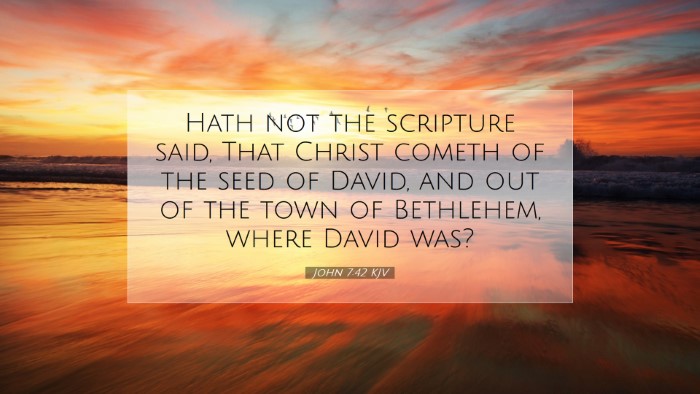Commentary on John 7:42
John 7:42 states, "Hath not the scripture said, That Christ cometh of the seed of David, and out of the town of Bethlehem, where David was?" This verse is part of a dialogue regarding the identity of Jesus Christ, highlighting the expectations concerning the Messiah from Jewish scripture. In this commentary, we will synthesize insights from several public domain sources to explore the layers of meaning within this verse.
Contextual Analysis
In John 7, the Jews are grappling with conflicting opinions about who Jesus is. The verse displays a common understanding among the people regarding the prophecies associated with the coming Messiah, primarily derived from the Old Testament. Matthew Henry remarks on the significance of location in prophecy, emphasizing that the Messiah's birthplace in Bethlehem aligns perfectly with God's divine orchestration of events.
Historical Background
According to Albert Barnes, the expectation of the Messiah coming from Bethlehem was well-known among the Jews, stemming from Micah 5:2. This prophecy directly connects Jesus to the lineage of David, which is crucial for establishing His messianic credentials. The emphasis on Jesus being the seed of David is echoed throughout the New Testament, reinforcing the belief in Jesus as the rightful heir to David’s throne.
Theological Implications
John 7:42 dives deep into the theological implications concerning the nature of Jesus as the Messiah. Adam Clarke argues that the acknowledgment of Jesus as coming from David's line is paramount in recognizing His authority and fulfillment of Old Testament prophecy. This acknowledgment signifies not only His rightful place as king but also His role within God’s salvific plan for humanity.
Messianic Expectation
-
Fulfillment of Prophecy:
The reference to Bethlehem indicates a fulfillment of the prophecies about the Messiah's birthplace, making it essential for believers to understand the continuity of biblical revelation.
-
Lineage of David:
Each gospel writer emphasizes this lineage, meticulously tracing Jesus' ancestry to instill assurance of His identity as the Messiah. Matthew Henry notes that the lineage is not just about royal blood but fulfills the prophetic heritage of God's chosen people.
Responses to Jesus’ Identity
During this discourse, various responses arise regarding Jesus' identity. Some proclaim Him to be the Christ, while others doubt due to their preconceived notions and interpretations of scripture. Barnes highlights that the people's question signifies a struggle between societal expectations and spiritual truth. Many were thus conflicted, attempting to reconcile the scriptural evidence with their personal experiences and beliefs.
Application for Today
This verse serves as a pivotal reminder for modern readers. It challenges pastors, students, and theologians alike to scrutinize preconceived ideas regarding Jesus and His mission. Matthew Henry encourages believers to seek a deeper understanding of scripture and recognize how Jesus fulfills these ancient promises in our contemporary context.
Key Takeaways:
-
The Importance of Scripture:
Understanding scripture is essential for recognizing Jesus’s true identity. The more grounded believers are in the Word, the clearer their comprehension of who Jesus is.
-
Encouragement for Dialogue:
This passage illustrates the necessity of dialogue about faith. Early believers wrestled with their beliefs, and present-day believers must engage with both scripture and fellow believers to grow in their understanding of Christ.
Conclusion
John 7:42 encapsulates the intersection of scriptural prophecy, communal expectation, and individual belief regarding the identity of Jesus as the Messiah. Drawing from the insights of Matthew Henry, Albert Barnes, and Adam Clarke, we gain a well-rounded perspective that not only elucidates the historical and theological significance of the verse but also invites modern readers into a deeper engagement with their faith. The challenge remains for us to consistently reconvene with scripture, articulate our beliefs, and cultivate an understanding that transcends societal expectations, pointing always back to the foundational truths of God’s Word.


